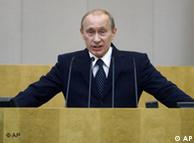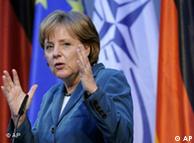International Relations | 27.05.2008
Merkel Calls for Closer Ties Between Russia and NATO
German Chancellor Angela Merkel has urged more cooperation and dialogue between Russia and NATO at a meeting of the military alliance in Berlin.
Speaking at NATO's spring parliamentary assembly in Berlin late Monday, May 26, Merkel called for closer ties between Moscow and the western military alliance.
"There is a fundamental interest in intensifying NATO-Russian cooperation," Merkel said.
"For the first time in years we have had a Russia-NATO summit (at Bucharest in April). If we don't talk to each other it is no wonder when there are prejudices," Merkel said.
The German chancellor called for more regular NATO-Russia summits, "not in order to give Russia a say (in NATO affairs) but in order to appreciate each other's fears and interests."
Strained ties
Relations between Russia and NATO have been frosty in recent months in light of the military alliance's proposed expansion into the Balkans and eastwards to Ukraine and Georgia.
 Bildunterschrift: Großansicht des Bildes mit der Bildunterschrift: Putin remains wary of NATO's intentions
Bildunterschrift: Großansicht des Bildes mit der Bildunterschrift: Putin remains wary of NATO's intentions
Moscow remains deeply suspicious about NATO's push into former Soviet territory. The official line from NATO is that membership in the alliance brings with it stability and security.
Despite attempted conciliation during a recent bilateral summit with US President George W. Bush, former Russian Premier Vladimir Putin still believes NATO expansion into Ukraine and Georgia would be a direct threat to Russia.
"The appearance of a powerful military bloc on our borders will be taken by Russia as a direct threat to the security of our country," Putin said at the NATO summit in Bucharest last month.
He also challenged NATO's argument that Russia would benefit from having stable, Western-backed democracies as neighbors. "The entry of Latvia into NATO has not changed a thing for those hundreds of thousands of people," Putin said. "NATO is not a democratizer."
New EU pact with Russia
Merkel added on Monday that talks on US plans for a missile defence shield in eastern Europe, a project bitterly opposed by Moscow, are "of the highest importance."
The missile shield is one of several key issues along with tensions over Georgia expected to come up in talks when new Russian President Dmitry Medvedev visits Germany at the beginning of June.
Merkel's comments came on the same day that the European Union gave the go-ahead for a new pact with Russia after 18 months of delay.
The new partnership agreement would cover political and economic ties, including energy and trade.
The talks are likely to address issues such as security of energy supplies and human rights.
The EU hopes to launch the talks formally at an EU-Russia summit in Siberia next month.
While the EU is hoping to make a fresh start with Russia under its new President, Dmitry Medvedev, the talks are likely to be long and difficult.
Although trade between Russia and EU states has boomed in recent years, the political relationship has become increasingly strained.
"Negotiations will certainly not be easy. They will be complex negotiations. I don't want to speculate at this moment, but I think they will take quite some time," the EU's External Relations Commissioner Benita Ferrero-Waldner said.

Comments